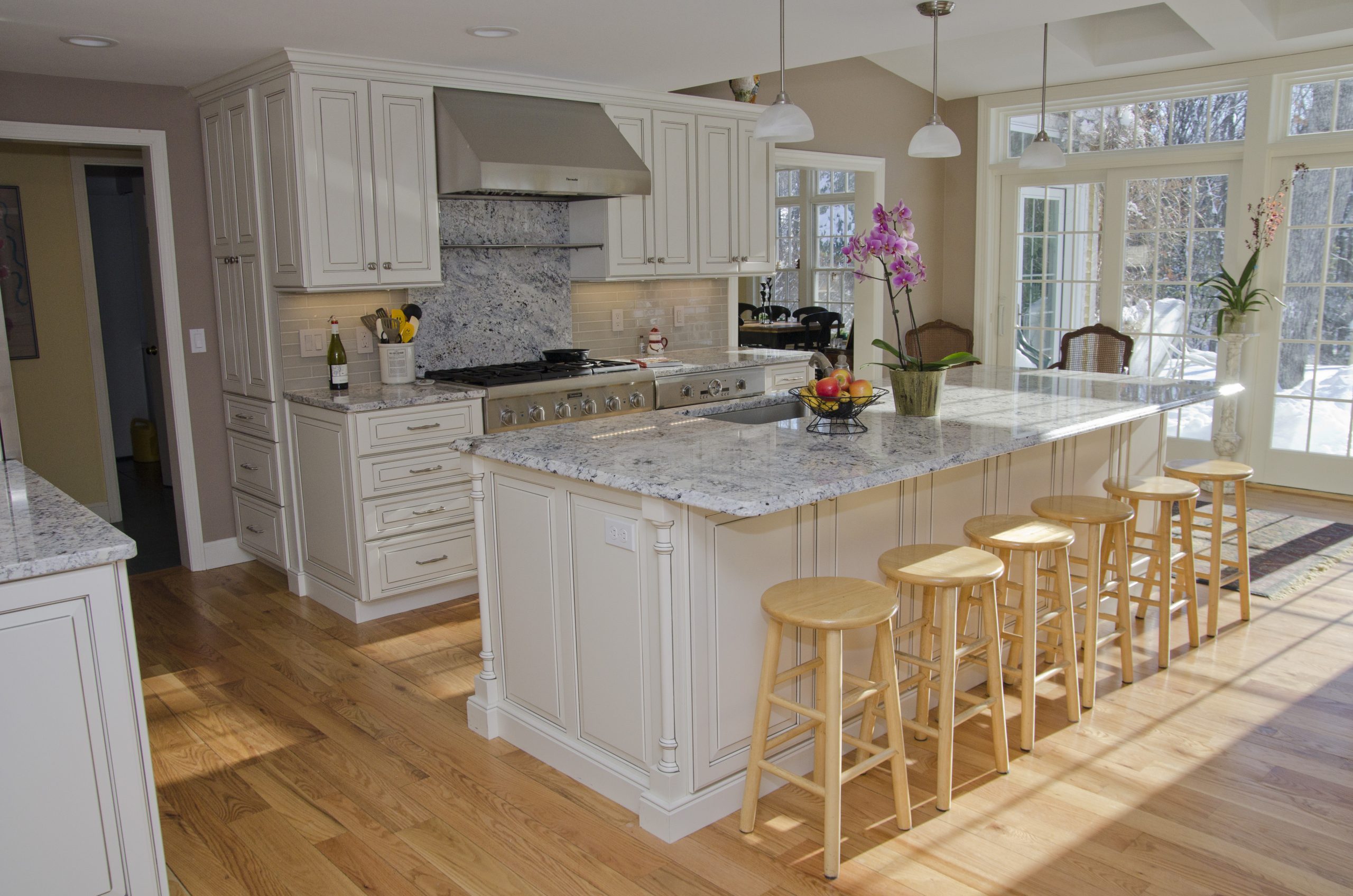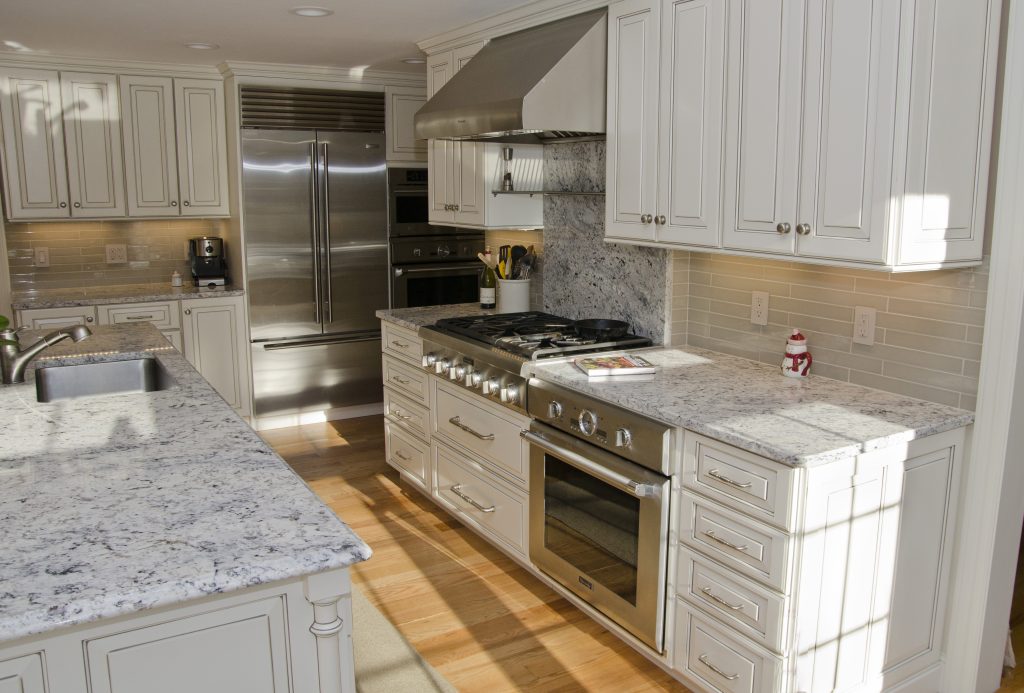

Renovating your kitchen can be one of the most exciting projects you’ll undertake as a homeowner, but it’s also a significant financial investment. With so many options to consider; from new cabinets, countertops, lighting, flooring to appliances; it’s easy to let the costs spiral out of control. That’s why creating a proper kitchen renovation budget is essential. Without a clear plan, what should be a fun and rewarding process can quickly become a very stressful experience. So, how do you create a budget that works for you while ensuring that your dream kitchen becomes a reality?
Let’s go over the key steps for properly budgeting your kitchen renovation.
Know Your Goals
Before you even start calculating costs, it’s important to define your renovation goals. Are you simply refreshing the look of your kitchen with new countertops and cabinets, or are you planning a full-scale remodel that involves layout changes, new flooring, and high-end appliances?
The scope of your renovation will heavily influence your budget. A simple facelift costs significantly less than a full renovation that requires structural changes or adding more space with a home addition. For instance, updating cabinets and countertops might set you back tens of thousands dollars, while completely overhauling and redesigning the kitchen; can easily push the cost of the remodel into the hundreds of thousands.
Take time to think about what you want out of your renovation. Will your kitchen simply look better, or will it function better too? Defining your renovation goals upfront will help you allocate your budget to the most critical aspects of your project.
Set a Realistic Budget
When it comes to budgeting, the most important question is: how much should you spend? A good rule of thumb is to budget between 10-15% of your home’s overall value for a kitchen renovation. Kitchens are one of the most valuable areas of a home, so this percentage ensures you’re making a wise investment that can increase your home’s resale value.
For example, if your home is valued at $500,000, a reasonable kitchen renovation budget would be between $50,000 to $75,000. This range ensures that you’re neither over- nor under-investing, keeping your renovation in line with your home’s value and the potential return on investment.
It’s crucial to be realistic about your financial situation and what your home is worth. Over-investing in a kitchen that is out of sync with your home’s market value may not pay off in the long run. However, keep in mind that if you have an older home and haven’t updated the kitchen, the new kitchen needs to be updated to the new building codes which can significantly add to the cost of the remodel.
Your Location Matters
Where your home is located greatly influences the cost of the products and labor to remodel your kitchen. The skilled labor required to remodel a kitchen such as finish carpentry, licenced plumbers, licenced electrician, skilled tile installers, experienced flooring installers, and more will greatly increase the cost and affect the overall appearance of your new kitchen. A good contractor can make or break the success of your renovation.
Prioritize Your Spending
Once you’ve set a realistic overall budget, it’s time to break it down. Every element of your kitchen won’t require the same level of investment, so prioritizing your spending will help you get the most out of your budget.
Here’s a typical breakdown for a kitchen renovation budget:
– 40-50% on cabinets
– 20-30% on labor and installation costs
– 15-20% on appliances
– 10-15% on countertops
– 10-15% on lighting and fixtures
– 5-10% on flooring and backsplash
The cabinetry is often the most significant portion of the budget. Depending on the quality of the cabinets such as ready to assemble (RTA), semi-custom, or custom cabinets affect the cost. Expect to pay more for higher level semi-custom and custom cabinets. Where the cabinets are manufactured and what raw materials they use matters. Opting for ready to assemble cabinetsmade of particle board can not compare to semi custom cabinets built with plywood sides and solid wood face and frames. Don’t overlook the cost of appliances as the cost can range from $10,000.00 for standard appliances to 40,000.00+ for high-end custom appliances. Don’t underestimate the cost of your countertops and opt for a product that will stand the high demands of kitchen use and remain timeless for 20-30 years. Don’t forget lighting, flooring, backsplash, hardware, and plumbing fixtures like the sink and faucet. You can find these materials in various price ranges to suit your budget.
Prioritize what matters most to you. We recommend investing in quality cabinetry as they are the foundation of a kitchen and the most costly to replace, next would be the countertops as they are complicated to replace. We suggest saving on the appliances, backsplash, lighting, and hardware as they are easier to replace. Aligning your budget with your priorities will keep your renovation budget on track.
Beware of Project Creep
Project creep is a term used to describe projects that start with a kitchen remodel and end up with a whole house update. This means that you are extending the scope of work to include updating the powder room next to the kitchen or the laundry room, foyer, or knocking down the wall between the dining room and kitchen which means that the work needs to include updating the dining room. Do you have wood flooring throughout the house including the kitchen? This means that if the floor needs to be repaired and refinished due to the kitchen work, all the floors need to be sanded and finished. This enhances the beauty and value of your home tremendously, but will also require a budget increase.
Plan for Contingencies
One of the most important things I tell all my clients is to plan for the unexpected. In any renovation, surprises can and likely will arise. Whether it’s discovering outdated wiring behind the walls or encountering hidden water damage, these issues can quickly eat into your budget if you’re not prepared.
We recommend setting aside 10-20% of your total budget as a contingency fund. For example, if you’re planning to spend $50,000 on your kitchen renovation, allocate an additional $5,000 to $10,000 for unforeseen issues. Having this financial cushion will ensure that these surprises don’t derail your renovation or cause unnecessary stress.
Be Realistic About DIY
Many homeowners are tempted to take on parts of the renovation themselves in order to save money. And while DIY projects can be a great way to cut costs, it’s important to be realistic about your skills and limitations.
Tasks like demolition or painting may be within your reach, but more complex work should be left to the professionals. DIY mistakes can end up costing you more in the long run, as hiring a professional to fix the error often ends up being more expensive than getting it right the first time.
If you’re unsure about which tasks you can take on yourself, consult with a professional designer or contractor. They can help you determine what you can DIY and what’s better left to the experts.
Stay Flexible, But Firm
Lastly, it’s essential to remain flexible throughout your renovation process—but not too flexible. It’s easy to get swept away by beautiful materials or fancy upgrades that weren’t in your original plan. This is what I like to call “budget creep.”
While it’s okay to make minor adjustments, staying true to your original budget will help you avoid overspending. A little flexibility is necessary, but discipline ensures you stick to your financial goals. When faced with tempting upgrades, ask yourself: does this align with my renovation priorities? Is it worth going over budget for?
In the end
Budgeting for a kitchen renovation can feel overwhelming, but it doesn’t have to be. By clearly defining your renovation goals, setting a realistic budget, prioritizing your spending, and planning for contingencies, you’ll be well on your way to creating the kitchen of your dreams.
By following these steps, you’re positioning yourself to complete your kitchen renovation on time, within budget, and without stress. If you’re ready to get started and need expert guidance, I’d love to help bring your vision to life. Contact me today, and let’s make your dream kitchen a reality!